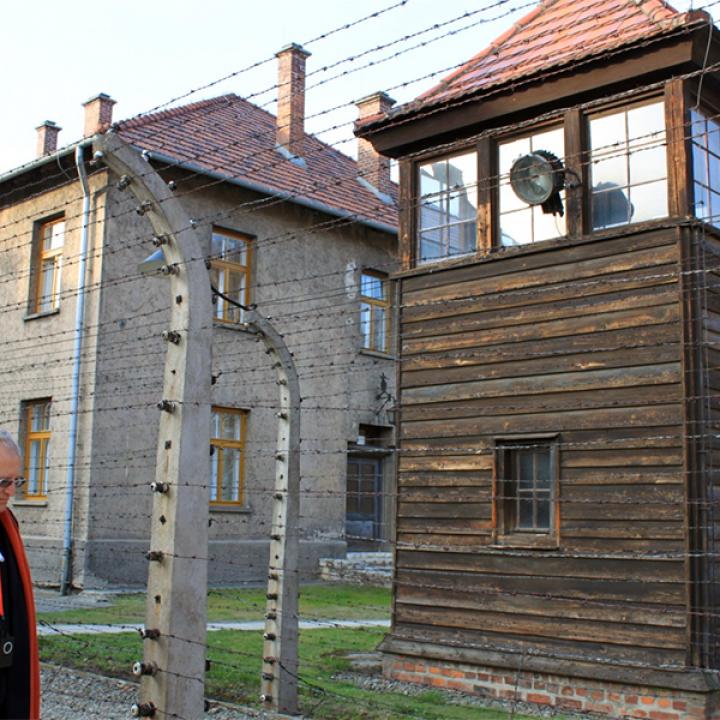
- Policy Analysis
- Policy Forum
A Learning Moment: Arabs, Palestinians, and the Holocaust

Two scholars discuss how the brushfire prompted by Prime Minister Netanyahu's comments concerning the Mufti of Jerusalem and the Holocaust can serve as a learning moment.
On October 28, Washington Institute executive director Robert Satloff and Weston Fellow Mohammed Dajani addressed a Policy Forum at the Institute's headquarters in Washington. A rapporteur's summary of Dr. Dajani's remarks is below; to read Dr. Satloff's prepared remarks, download the PDF.
Because Israel is a neighbor for Palestinians and Arab nations, all parties need to pursue reconciliation and coexistence based on peace and justice, not exclusion. Unfortunately, many Palestinians only see other parties in the conflict, including Israel and the United States, as the "other," and hatred of the other leads to a vicious "us vs. them" mentality. This outlook reduces Israel and the United States to superficial politics and prevents Palestinians from understanding U.S. and Israeli culture and history, as well as their own.
Many on both sides of the conflict also fixate on the past. This lack of personal and collective resiliency against tragedy and loss prevents individuals and communities from understanding themselves, their neighbors, and their enemies. Instead, they should prioritize building a better future.
Taboos in Palestinian society further inflame the conflict and weaken the moderate majority, who need stability and growth to provide for their families. Restrictions on discourse, explicit or implicit, foster extremism and anti-Semitism, which can be seen in the case of Palestinian perspectives on the Holocaust. The Holocaust was a tragedy for the Jewish people, but also for humanity. The constant comparison between the Naqba and the Holocaust in Palestinian society reflects lack of knowledge about an undeniable fact of history. At the same time, Israeli insistence of blocking the Naqba from their history lessons leads to more discord and conflict.
The American Studies Program at al-Quds University and the Wasatia Movement are meant to address these problems in Palestinian culture and represent those committed to Islam and its true nature of peace, forgiveness, and compassion. Building bridges can facilitate mutual understanding, goodwill, and reconciliation between Israelis and Palestinians. Both sides need to recognize and reconcile their clashing narratives while also being self-critical. A truthful examination in both communities would also engender optimism about the future. After all, most Israelis and Palestinians want their children to enjoy normal lives, even though they are held hostage by a loud and violent minority.
Visionary, courageous leaders are needed as well. Today, too many leaders and citizens are bystanders or, sometimes, instigators. In March 2014, after I returned from a trip to Auschwitz with a group of Palestinian students, our local communities and university colleagues stood silent against an instigated uproar. Nine Palestinian student groups at al-Quds University, including Fatah, published a communique titled "Normalization Is Treason," and instead of defending academic freedom, the university accepted my resignation. President Mahmoud Abbas had told Jewish leaders that the Holocaust was "a heinous crime," but he never met with the students who visited the Nazi concentration camps to reinforce this message or defend it against those who label it treason. Leaders need to provide the same message to their constituencies that they communicate abroad.
The students who visited Auschwitz did not become less nationalistic, but they did become more humanistic. Despite the rejection they faced from their neighbors, many showed moral courage by defending the visit and sharing their experiences, regionally and globally. Empathy can counter the cycle of enmity. Statements like Prime Minister Binyamin Netanyahu's recent comment about the Mufti of Jerusalem's role in the Holocaust, which distort history and deny the other side's humanity, only further the cycle.
This summary was prepared by Patrick Schmidt.
Mohammed Dajani is the Weston Fellow at The Washington Institute and founder of the Wasatia movement of moderate Islam. A former professor of political science at al-Quds University and founder of its American Studies Program, he has written extensively on Arab culture and politics, including a 2011 International Herald Tribune op-ed coauthored with Dr. Satloff, "Why Palestinians Should Learn About the Holocaust."
Robert Satloff is the Institute's executive director and the author of Among the Righteous: Lost Stories from the Holocaust's Long Reach into Arab Lands (2006), which was made into a 2010 PBS documentary of the same name that has aired around the world in Arabic, French, and German.





